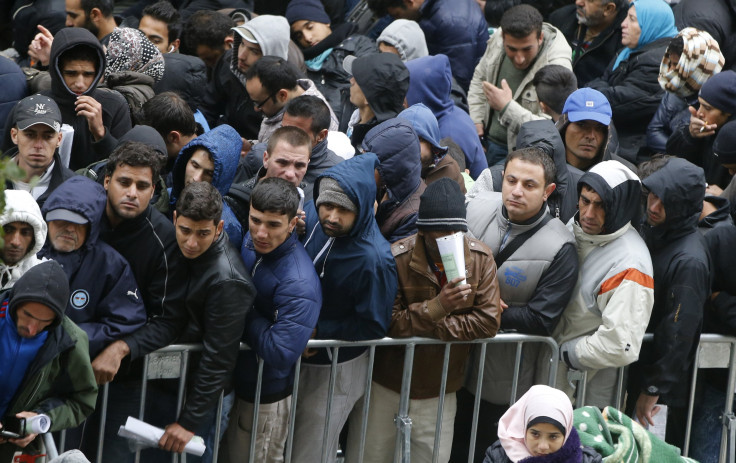EU Gets Tough On Expelling Migrants, Talks To Neighbors

By Alastair Macdonald and Tom Korkemeier
LUXEMBOURG (Reuters) -- European Union governments agreed on Thursday to step up deportations of illegal immigrants and discussed creating an EU border force among measures to cope with hundreds of thousands of refugees from Syria's civil war.
Underlining the havoc brought by chaotic mass treks across Europe's open borders over recent months, the German state of Bavaria threatened to break ranks with Berlin and send back to Austria migrants who cross its Alpine frontier.
Chancellor Angela Merkel, whose welcome for refugees has taken a toll on her ratings, insists she will not shut the door. Her deputy said there could be no pulling up of "drawbridges". Austria's interior minister warned of possible border "riots".
The dispute between Vienna and one of Germany's richest regions, which says over 200,000 migrants entered from Austria in a month, helps explain Merkel's vocal support this week for the expulsion of those not fleeing for their lives and for tighter controls on who enters Europe across the Mediterranean.
A policy document approved by EU interior ministers meeting in Luxembourg called on states to ensure more of those ordered to leave should actually go. Some 470,000 expulsion orders were made last year but fewer than 40 percent of them were enforced.
Ministers declined to put figures on future deportations.
"Increased return rates should act as a deterrent to irregular migration," read the conclusions, which also included approval of detention for those who may abscond before expulsion and called for more "leverage" to be exercised on African and other poor states, including via aid budgets, to make them accept the return of citizens refused entry to Europe.
"Returns are always tough," German Interior Minister Thomas de Maiziere told reporters. "But ... we can only offer space and support to refugees in need of protection if those who don't need protection don't come or are quickly returned."
NEIGHBORS INVITED
Later, interior ministers were joined by foreign ministers from the EU, Balkan states,Turkey, Jordan and Lebanon to review broader efforts to stem the flow of refugees and economic migrants from the Middle East, through Greece and the Balkans.
"It's joining forces to tackle an issue that is going to be very difficult to solve," said EU foreign policy chief Federica Mogherini of a meeting that produced a declaration pledging more EU aid for neighboring states to help cope with refugees.
Attendees also agreed to work to end the war in Syria and stabilize Iraq and Afghanistan and also to step up expulsions and aid programs to persuade economic migrants to go home.
Echoing a call by President Francois Hollande on Wednesday, French Interior Minister Bernard Cazeneuve proposed beefing up the EU's Frontex borders agency and, in time, establishing a European Border Guard service with expanded powers to step in where national authorities had difficulty managing EU frontiers.
Ministers said there was broad agreement -- though some also stressed the importance of preserving national sovereignty, a particular concern for those on the Mediterranean frontline.
"A Europe without secure external borders will be a Europe with internal border checks," said de Maiziere, referring to the kind of row that has since Hungary line its frontiers with razor wire and EU allies start police checks on cross-border traffic.
Visiting an asylum center in Bavaria, Jean-Claude Juncker warned that 25 million were on the move in regions not far from Europe, more than the continent could cope with. But the answer, he said, was not Cold War-style fortification: "We had a Wall in Europe long enough," he said. "And we certainly don't need any between member states of the European Union."
RELOCATION
One of the most divisive issues for EU states has been new programs obliging them to take in asylum seekers from the frontline states of Italy and Greece.
However, the first such relocation, of Eritreans heading to Sweden from Italy, is due to take place on Friday. That movement has been a key demand for Rome. The coming months will provide a major test of how realistic EU plans are. Italy has already warned that it is not willing to host "concentration camps".
(Additional reporting by Robert-Jan Bartunek in Brussels, Madeline Chambers in Berlin and Jens Hack in Passau; Editing by Toby Chopra)
© Copyright Thomson Reuters 2024. All rights reserved.







